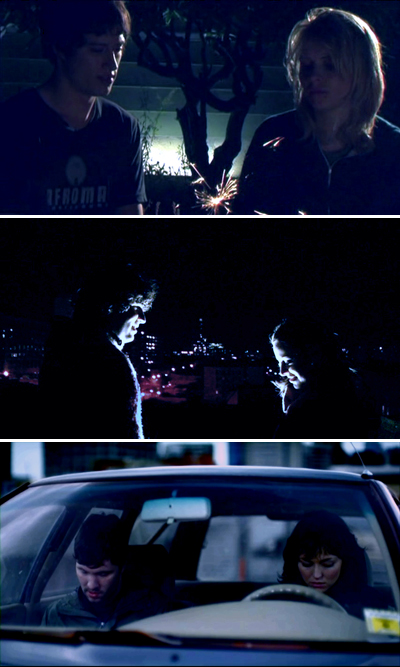

In Dance Party USA you dealt with adolescence, but you didn’t reintroduce that topic in your next movies. What took you to write about teenagers in your debut?
The thing that started me writing the script that eventually became Dance Party was an overheard conversation on a train. It was a much longer version of the scene that introduces Gus and Bill. I didn't mean to write about teenagers necessarily, but that was the age of the people I heard.
Your characters are very emotional and realistic. Do you think the actors should be as humble and honest as your characters? How do you feel when watching all those movies with ideal and non-realistic characters?
Both the actors and the director should focus on doing the work needed so that everyone is comfortable with their characters. I never have a specific line reading in mind and I hope that the actors don't either. If we've done our work the combination of the actors living in their circumstances and interacting should be enough. As for movies with idealized and non-realistic characters, it really depends on the movie. Some of my favorite movies have heightened characters. I like Die Hard and Jurassic Park a lot. More recently I enjoyed Mission Impossible: Ghost Protocol and the Fincher version of The Girl With the Dragon Tattoo. What really bothers me are movies that purport about be about real people, but are not. I would put a lot of Oscar nominated movies in that category.
All the main characters of your movies play with toys or use children’s objects (such as the sparklers in Dance Party USA, the keyboard and the wrecker in Quiet City, and the candy in Cold Weather). Is it childhood a shelter to come back to when the maturing process gets complicated?
I think that people feel like they ought to give up things from childhood when there's no real reason to. I enjoy a lot of things from my childhood. Just for example I couldn't resist buying a Playmobil Viking ship a couple years ago. Part of me felt silly buying it, but it was too cool to pass up and I really enjoy having it. It is a shelter in a way, but you could also think of reading books, having cocktails, going to the movies or any other enjoyable adult activity like that. Letting yourself enjoy what you enjoy is important to me and I guess the characters in my movies feel the same way.
How important is the city in your stories? The main characters are well drawn and they are the center of your plots, but you always use shots of the city the action is taking place in.
Location is important to me in movies because it's so important in how we live our lives. When I remember different periods of my life the city I lived in is always important. I've lived in Portland, North Carolina, New York, and Pittsburgh and all of them have been completely different. What you see, how you get around, where you choose to go are all tied to where you are. I like movies that reflect that and it's an important part of making movies for me.
How different was filming the brother-sister relationship in Cold Weather after two films based on main characters falling in love? Did it change your approach to the script and the direction?
Filming wasn't that different. Every character has different specific circumstances and that's the starting point. So in this case the biggest difference wasn't the fact that they were brother and sister, but that they had a relationship that went back a long way. People who have known each other for a long time -- brothers and sisters, old friends, people who are married -- have a different way of relating to each other. A lot goes without saying in those kind of relationships. That's hard to capture with actors who haven't met before so Cris and Trieste and I spent a lot of time developing Doug and Gail's history with each other. I had the two of them meet in a casual setting far in advance of shooting. They got to know each other really well and, as it turned out, their relationship when we weren't shooting ended up being not too different from their relationship onscreen.
Some young people may feel identified with your characters. Which filmmakers/movies do you feel identified with?
Seinfeld comes to mind. Obviously the show takes place in a heightened reality, but I can't think of anything else that addresses the concerns of modern American life so accurately. Other than that I identify not so much with movies about people in similar circumstances to me, but with movies about people who behave truthfully. There's so many movies that are supposed to be about people behaving truthfully that feel so strange to me. I look at what people are doing and it doesn't make any sense to me. It doesn't look to me like how people are. I appreciate Ozu's movies because, even though the circumstances are very different from my own, the way people relate to life feels familiar and true. I would say the same about the TV version of Friday Night Lights. Actually, now that I think about it, I would put Friday Night Lights seasons 1 and 3 on par or even above Seinfeld for reflecting modern life in America.
Leaving aside labels made up by critics, do you feel part of any generational group of filmmakers? Is there any director you share thematic worries or production’s issues with?
There's certainly a lot of people who share the same production issues. There's never enough money or enough time. On the positive side we all have access to the same technology that allows people with not very much money the ability to make a movie. The advent of Final Cut Pro and relatively inexpensive high quality cameras has changed who can make a movie. In terms of content, I think that everyone of a similar age in a similar place is part of a generational movement, but my approach is very different from, for example, Andrew Bujalski or the Duplass Brothers.
In which role do you feel more comfortable: as a director, scriptwriter or editor? Would you like to direct somebody else’s script?
Of course all those roles are very different, but to me they're all different stages of the same process. It's more a matter of the task at hand than one feeling more comfortable than another. And I would absolutely direct somebody else's script. It would have to be a project I felt excited about, but I don't see any reason to only direct what I write.
Is your minimalistic and intimate style conditioned by production’s aspects such as low budgets and working with people who are close to you? Or is it your style as a filmmaker? How would it be an Aaron Katz’s movie if it had a larger budget?
The style of any movie has to fall within the parameters of the production, but there are a lot of aspects that I wouldn't change with more money. With more money I would consider shooting on film and it would open up the possibility of making a period movie or a movie with heavier genre aspects.
All your three movies deal with issues related to growing up. What will be your next step? Will you continue working on those topics or would you rather do something different?
I'm working on developing a few different projects at the moment and they span a pretty wide range. I don't think very much about what issues a certain movie brings up when I'm writing it. Typically the less I think about writing the happier I am with it, so I'm not sure what's next.
| Twittear |
|
 |
|


